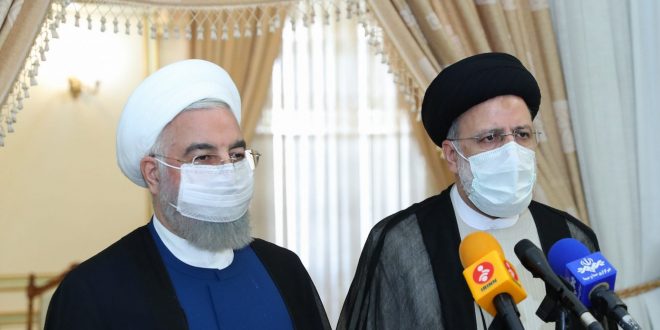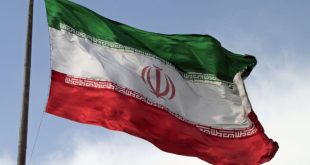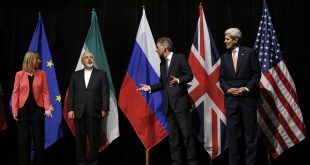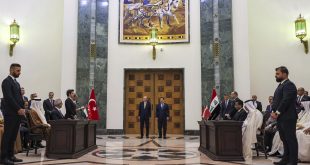With the election of Ebrahim Raisi as the new Iranian president and the start of the Vienna talks between Tehran and Washington, a new balance of power is expected to be seen in the context of a possible new deal.
In recent months, with the start of the Vienna talks between Iran and the United States, a new balance of power is expected to be seen in the region, following a possible new deal. A possible deal between the two sides could not be considered a victory for Iranian diplomacy, as Biden had stated to return to a nuclear deal with Iran during his presidential campaign. So far, there have been five talks between the representatives of Iran and the United States in Vienna, and despite some disagreements, no deal has been reached between the two sides. Although Biden has insisted on returning to the nuclear deal, it should be noted that Iran needs a new deal with the aim of lifting sanctions due to tough economic conditions. But the continuation of Iran’s regional foreign policy and the cessation of Iran’s missile and nuclear program, for which Tehran has spent hundreds of billions of dollars to develop, are among the reasons why the process of signing the new agreement is progressing slowly.
One of the most important issues influencing the nuclear talks was the Iranian presidential election. Despite Iranian officials repeatedly saying that the election did not affect the negotiation process, most political observers believe that the United States is willing to reach a deal with the next adminstration .
Even though a round of talks between Iran and the United States had been held in Vienna until the last week of May, the two sides have not been able to reach an agreement so far. Meanwhile, Iran’s presidential election has prevented a new agreement from being reached. Some Iranian experts believe that the US government will prefer to reach an agreement with the new Iranian government after the June presidential election. Under Trump, in line with the policy of maximum pressure campaign in addition to the non-acceptance of these conditions by Iran and the continuation of Iran’s nuclear and missile program, there was no room for a new agreement between the Iranian government and the United States. Such support for Bashar al-Assad’s government was in stark contrast to US interests in the region, and the two countries were unable to resolve the existing problems under the new deal.
The nuclear program
There are several issues that need to be addressed on the new details in the new agreement, within a specific framework. Iran’s nuclear program is the most important point of contention between Iran and the United States. Iran has always emphasized the peaceful nature of its nuclear program, but, in recent years, there has been ample evidence of some of Iran’s nuclear facilities that contradicts its claim. Following the recent attack on the Natanz nuclear facility, Iran announced that it was beginning the process of enriching uranium up to 60 percent, which made it even more difficult to reach a new agreement. Iran has considered the nuclear bomb as a deterrence.
One of the important issues that can be delayed in reaching a nuclear deal is the issue of keeping enriched uranium in Iran. The transfer of this amount of enriched uranium to another country can be agreed between the two countries. Of course, it remains to be seen whether Iran will agree to such an offer. It is natural that the countries in question are opposed to increasing the level of uranium enrichment in Iran.
The missile and drone program
One of the objections that the Donald Trump administration always made to the nuclear deal is that it does not address the issue of Iran’s ballistic missile program. The missiles could seriously jeopardize US and allied interests in the Middle East. The US government also claimed that UN Security Council Resolution 2231, which commits member states to implementing the provisions of the Comprehensive Nuclear-Test-Ban Treaty, obliges Iran to refrain from any activity related to ballistic missiles designed to carry nuclear weapons for eight years after the implementation of the JCPOA. Iran claims that this part of the resolution is not binding and that it does not seek nuclear weapons. Iran, which has the largest and most diverse arsenal of ballistic missiles in the Middle East, according to the Center for Strategic and International Studies, also claims that its missile program is defensive and that it is unwilling to negotiate.
Due to the exhaustion of Iran’s air fleet due to sanctions and its inability to purchase warplanes in recent decades, Iran has paid special attention to the development of missile programs, and, at the same time, has made significant progress in the production of drones in recent years. The recent drone attacks on Saudi refinery facilities underscore the importance of a regional drone program development in Iran. The use of Iranian drones by Iranian-backed armed groups in Yemen poses a serious threat to Saudi Arabia’s security and energy infrastructure. Due to the recent poor economic conditions of Iran, and especially after the outbreak of COVID-19, Iran continued its missile and drone program and provided the necessary financial resources for its development. In January, Jake Sullivan, the United States National Security Advisor said, “Iran’s ballistic missile program should be on the table as part of the next round of talks” after the possible return of the JCPOA. “The defense of the Islamic Republic of Iran has never been negotiated“ Saeed Khatibzadeh, the Iranian Foreign Ministry Spokesperson, told in a news conference in response to Biden’s remarks. Three drones are said to have targeted the al-Assad base and one base near Erbil Airport. According to the report, they used suicide bombers for the first time in an attack by Iraqi militants last April. Reuters quoted an anonymous US official saying that the drone was made in the Islamic Republic and that Houthi rebels had previously used a similar one to attack Saudi Arabia. Given the Biden government’s foreign policy priorities, as well as his explicit announcement of a return to a nuclear deal with Iran, a new deal can be expected to be signed soon. Biden’s special attention to China and Russia will help resolve issues such as Iran’s nuclear program within a certain framework. The issue of Iran has a relatively smaller place in US policy agenda, which may adversely impact the nuclear agreement.
Sanctions
In recent months, during the Vienna talks, Iran has repeatedly asked the United States to lift all sanctions imposed by the US government before the new agreement, but this request has not been met by Biden. But the main issue is that some of the sanctions imposed by Trump (supporting terrorism) against Iran are simply not possible to lift, and this has made Biden unable to give Iran more concessions before negotiating. In the event of a possible agreement, the lifting of sanctions against Iran’s oil exports and banking sanctions could help improve Iran’s economic situation to some extent. Iran has stored 69 million barrels of oil in tankers at the time of the sanctions, and, by lifting the sanctions in the short term, it can send that amount to the market. To both regain market share and improve economic conditions, given the prevalence of coronation in Iran and the low rate of vaccination in Iran after a possible agreement or even before, the use of health diplomacy by the United States and the dispatch of the COVID-19 vaccine, the agreement will speed up the process of the agreement, even though the use of British and American vaccines has been banned by Iranian authorities.
It is natural that the United States will oppose Iran’s acquisition of nuclear weapons. In the meantime, Israel will have all the necessary means to prevent Iran from acquiring an atomic bomb. It seems that the United States will continue to pursue a regional policy to the extent that US interests in the region and Washington’s allies in the region are not harmed. The possible new agreement waives its regional interests. Iran could delay its nuclear missile and drone program for some time. However, due to the importance of this program in national security and Tehran’s regional policy, these programs will not be easily ignored. The use of Iranian-made weapons and drones by proxy groups to strike at US military interests and bases in the region, as well as the interests of US allies in the region, is not something that the United States is indifferent to. Iran’s poor economic situation has made it more difficult for regional policy to continue and to support proxy groups. If Iran’s economic situation were normal, Tehran would not want to make the slightest change in regional policy and its missile and drone nuclear program. If the conservatives come to power following the Iranian presidential election, which seems likely, it should see the continuation of the current regional policy and the increase of Iran’s influence and presence in the region.
Human rights
Despite all the support for the new agreement between Iran and the United States, some believe that, given that the Middle East and Iran are not the main priorities of US foreign policy, Washington should not ignore issues such as human rights and individual freedoms in Iran after a possible agreement. Those who criticized the Iran nuclear agreement did so based on the claim that the agreement did not address the abuse of human rights by the Iranian government, which was true to some point. But this had not been the aim of the agreement. However, it was during the Trump administration that the agreement was ceased, and, in the last four years, masses of protestors were killed by the regime.
Conclusion
Naturally, the Biden government will closely monitor the Iranian elections and will consider the regional situation and the balance of power in the region after the Iranian presidential election. The question is whether, after the new agreement and the lifting of sanctions, Iran’s blocked financial resources will be returned to Tehran and whether Iran will use the bulk of these financial resources to develop its nuclear and missile programs, as well as a group of proxy groups. How will the Biden government react?
In fact, Tehran wants all sanctions lifted, and that means something beyond the 2015 nuclear deal. Given that the US government is also aware of the power structure and decision-making process in Iran, it is obvious that reaching a new nuclear deal depends on the results of the presidential election in Iran. Given that in Iran, it is not only the government that is the main decision-maker, to which even Zarif referred to in his interview on the effective role of military forces in Iran’s regional policy. With the victory of Ibrahim Raisi in the June 18 presidential election, it can expect a new deal between Iran and the United States to be reached in the coming weeks and before the end of Hassan Rouhani’s presidency.
Ebrahim Raisi at the end of the presidential debates on the nuclear deal and the forthcoming talks between Iran and the United States, said that: “foreign authority is an extension of domestic authority. You cannot implement JCPOA when Iran’s economy has many problems. JCPOA is a deal that, with its terms approved in the country, JCPOA can be implemented by a powerful government. We are committed to JCPOA’s 9 clauses, which was approved by the supreme leader, but Rouhani administration cannot implement JCPOA. JCPOA needs a powerful government, foreign authority is an extension of domestic authority”. Given that Khamenei has emphasized that: “everyone should know that foreign policy everywhere in the world is related to high-level assemblies and high-ranking officials of the country. It is the upper echelons that determine foreign policy … The Ministry of Foreign Affairs is subject to these decisions, and it is the same here in our country.” The new president will move in the direction of the foreign policy intended by the supreme leader.
A win-win situation is the best way to reach a new nuclear deal. It was expected that a new deal would be reached in the sixth round of talks, but as the differences continued, the results of the presidential election in Iran should be more accurate. If no new deal is reached after the presidential election and the new administration in Iran continues the policy of the Rouhani administration, Iran will have to witness economic and social crises in the coming months.





